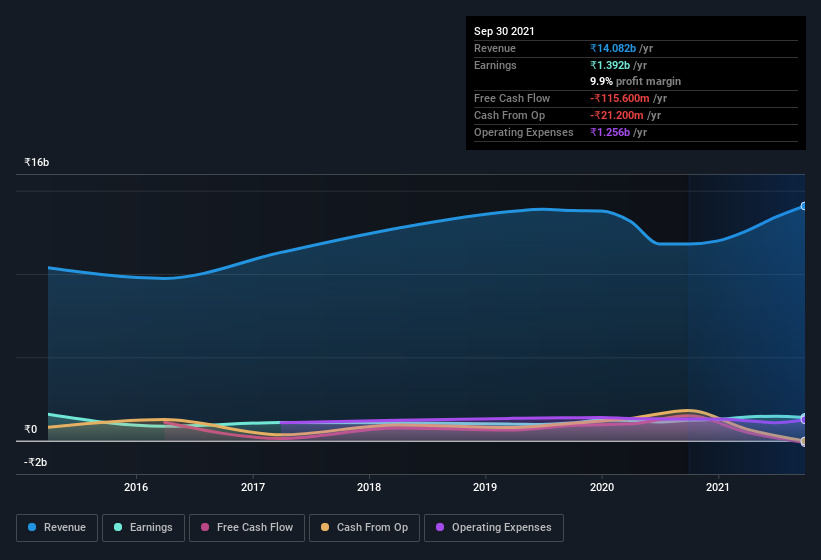Tide Water Oil (India) (NSE:TIDEWATER) Strong Profits May Be Masking Some Underlying Issues
Tide Water Oil Co. (India) Limited's (NSE:TIDEWATER) robust recent earnings didn't do much to move the stock. We think this is due to investors looking beyond the statutory profits and being concerned with what they see.
View our latest analysis for Tide Water Oil (India)

Examining Cashflow Against Tide Water Oil (India)'s Earnings
In high finance, the key ratio used to measure how well a company converts reported profits into free cash flow (FCF) is the accrual ratio (from cashflow). In plain english, this ratio subtracts FCF from net profit, and divides that number by the company's average operating assets over that period. This ratio tells us how much of a company's profit is not backed by free cashflow.
Therefore, it's actually considered a good thing when a company has a negative accrual ratio, but a bad thing if its accrual ratio is positive. While having an accrual ratio above zero is of little concern, we do think it's worth noting when a company has a relatively high accrual ratio. To quote a 2014 paper by Lewellen and Resutek, "firms with higher accruals tend to be less profitable in the future".
Tide Water Oil (India) has an accrual ratio of 0.27 for the year to September 2021. Unfortunately, that means its free cash flow fell significantly short of its reported profits. Over the last year it actually had negative free cash flow of ₹116m, in contrast to the aforementioned profit of ₹1.39b. It's worth noting that Tide Water Oil (India) generated positive FCF of ₹1.5b a year ago, so at least they've done it in the past. One positive for Tide Water Oil (India) shareholders is that it's accrual ratio was significantly better last year, providing reason to believe that it may return to stronger cash conversion in the future. Shareholders should look for improved cashflow relative to profit in the current year, if that is indeed the case.
Note: we always recommend investors check balance sheet strength. Click here to be taken to our balance sheet analysis of Tide Water Oil (India).
Our Take On Tide Water Oil (India)'s Profit Performance
Tide Water Oil (India) didn't convert much of its profit to free cash flow in the last year, which some investors may consider rather suboptimal. Because of this, we think that it may be that Tide Water Oil (India)'s statutory profits are better than its underlying earnings power. Nonetheless, it's still worth noting that its earnings per share have grown at 35% over the last three years. The goal of this article has been to assess how well we can rely on the statutory earnings to reflect the company's potential, but there is plenty more to consider. If you want to do dive deeper into Tide Water Oil (India), you'd also look into what risks it is currently facing. Our analysis shows 3 warning signs for Tide Water Oil (India) (1 makes us a bit uncomfortable!) and we strongly recommend you look at them before investing.
This note has only looked at a single factor that sheds light on the nature of Tide Water Oil (India)'s profit. But there is always more to discover if you are capable of focussing your mind on minutiae. Some people consider a high return on equity to be a good sign of a quality business. So you may wish to see this free collection of companies boasting high return on equity, or this list of stocks that insiders are buying.
New: Manage All Your Stock Portfolios in One Place
We've created the ultimate portfolio companion for stock investors, and it's free.
• Connect an unlimited number of Portfolios and see your total in one currency
• Be alerted to new Warning Signs or Risks via email or mobile
• Track the Fair Value of your stocks
This article by Simply Wall St is general in nature. We provide commentary based on historical data and analyst forecasts only using an unbiased methodology and our articles are not intended to be financial advice. It does not constitute a recommendation to buy or sell any stock, and does not take account of your objectives, or your financial situation. We aim to bring you long-term focused analysis driven by fundamental data. Note that our analysis may not factor in the latest price-sensitive company announcements or qualitative material. Simply Wall St has no position in any stocks mentioned.
Have feedback on this article? Concerned about the content? Get in touch with us directly. Alternatively, email editorial-team (at) simplywallst.com.
About NSEI:VEEDOL
Veedol
Engages in the manufacturing and marketing of lubricants under the Veedol brand in India.
Flawless balance sheet with solid track record and pays a dividend.
Similar Companies
Market Insights
Community Narratives




